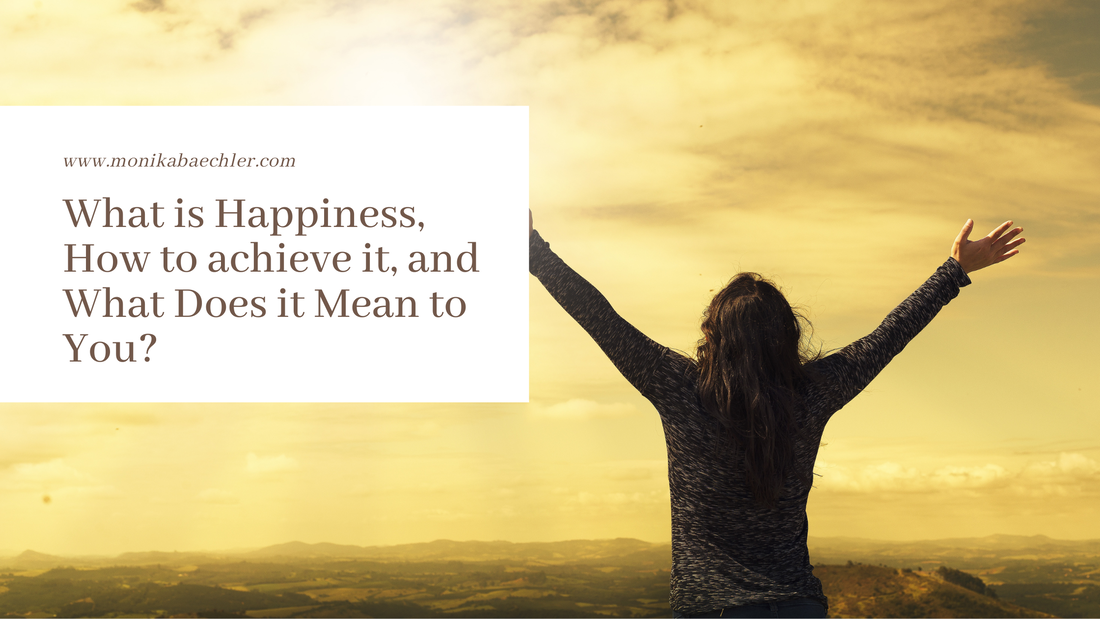|
We all want to be happy. But what exactly is happiness? Is it something we can achieve with a simple prescription? Or is it something that involves a bit more work? The answer depends on who you ask. The term "happiness" has been used in different ways throughout history. For example, in the 1700s, "happiness" refers to things like wealth and power. However, more recently, psychologists have defined happiness as an emotional state characterized by positive emotions and feelings. Our brains are programmed to seek positive emotional experiences - we've evolved this way because these experiences are associated with survival. This explains why we feel good when we eat delicious foods or accomplish something challenging like climbing Mount Everest. But psychologists say that some things can make us less happy over time: for example, being in a bad relationship or working at a job we don't enjoy. Happiness is how you feel when you reflect on an experience or a moment in your life. It's an emotion that can't be explained by other emotions, like sadness or anger. We all strive for happiness in our lives, but how do we find it? What do we need to be happy or how can we experience happier states more often? First, think about what makes you happy. Is it spending time with friends and family? Is it taking care of yourself? Maybe it's having a certain amount of safety-net in your bank account or living in a certain place. Once you've figured out what makes you happy, start working toward making those things happen in your life. Happiness is a state of mind. It's not something we have to go out and find, but it's something that comes from within. You should avoid basing your personal happiness on another person like a spouse or partner. Happiness will never be something you buy, but it's definitely a state you can create within. Happiness is feeling good about yourself, your life, and the people around you. It's a moment of pure joy where everything seems perfect at that moment. It's knowing deep down inside that everything will eventually be okay no matter what happens in this world because you're going to survive it all and come out stronger than ever! Happiness is a feeling we all want to experience. We all strive for it, but it can be hard to define. For example, is there one thing that makes us happy or are there many things that make us happy? According to Harvard University, gratitude is strongly and consistently associated with greater happiness in positive psychology research. Gratitude helps people feel more positive emotions, relish good experiences, improve their health, deal with adversity, and build strong relationships. For those who don't know what gratitude is, the feeling of gratitude is a deep appreciation for all that we have in life. It's not just about counting your blessings but also meaningfully and sincerely appreciating them. For example, one person can be grateful for having a roof over their head, while another might be grateful they can eat three meals daily. Gratitude has been shown to benefit our physical health and mental well-being. Gratitude is a positive emotion we feel when focusing on the good things in our lives. It's not about focusing on what you don't have but appreciating what you do. Gratitude can be practised in many ways and every day, even if it only takes a few seconds to pause and reflect on all the great things in your life. When we practice gratitude, we live happier lives because we feel more satisfied with our current situation. How to practice Gratitude?The best way to practice gratitude is by keeping a gratitude journal. This can be done in several ways, like writing down your grateful thoughts on paper or typing them up and saving them as a text document. Having a gratitude journal allows you to reflect on what makes you happy - whether it be a memory from the past or something extraordinary happening right now! Here are some other ways that I've found helpful in maintaining my sense of gratitude:
I believe happiness is a feeling of contentment and fulfilment in life. It means you are satisfied with your life, and with yourself as a person. Happiness means enjoying the moment and finding joy in simple things like spending time with friends, going on a hike or getting lost in a good book. For me, I can experience bliss sitting with my knitting in front of the TV and enjoying my favorite movies. Happiness does not mean the same thing to everyone, though. It can be different for each person depending on their feelings towards life or their personal views on what happiness means to them. However, happiness is still the same when it comes down to the core meaning behind it all, which is feeling good about yourself no matter what happens externally. Please share, let me know what makes you happy and what happiness means to you. by Monika Baechler
0 Comments
Imagine a government that uses AI-driven technology to ensure its policies are as effective, efficient and transparent as possible. This would be great for all of us! But how do we get to this point? What does the future look like for AI-governance? And how can we ensure that it's done in the best interests of everyone?
Benefits of AI-Technology
If you have ever wondered what our daily lives will look like when the government is run by AI technology, this article is for you. AI-driven government promises a more efficient and effective administration with less human error and bias. In addition to processing and analyzing large amounts of data faster than humans, AI systems can also make better decisions without fatigue or emotion. Moreover, since machines do not have emotions or political agendas, they won't be influenced by lobbyists or self-interest groups like politicians – making them ideal leaders for any organization that needs objective decision-making skills to succeed (and survive). Who gets to control the algorithm? AI is not a black box, but it is also not transparent. The government needs to be able to explain and justify its decisions, even if that means exposing some things AI can't do well. But seriously, who gets to decide what data is used and how it is used? Who gets to decide what the AI does? Who gets to decide what the AI learns? Who gets to decide what the AI does not learn? These questions may seem trivial in an era where we have become accustomed to trusting our devices with all kinds of personal information about us; however, this complacency obscures important distinctions between government and private-sector use of AI. For example, when Facebook uses algorithms for advertising, you can generally expect that your data will be used toward specific commercial ends. Still, if Facebook were developing a policy making algorithm for use by state agencies or local municipalities, our concerns would need more thorough investigation than they currently enjoy. The danger here is obvious: If too much power over public decision-making were concentrated in private corporations whose goals are driven more by profit than civic responsibility, then those corporations could easily abuse their position by manipulating public opinion through targeted advertising campaigns aimed at vulnerable demographics. The challenges of AI With the possibility of AI being used in the government, it's essential to understand that AI is a tool, not a solution. It can be used for good or evil. In this section, we'll talk about why AI isn't here yet and what challenges still need to be overcome before it becomes mainstream. AI is not a substitute for human decision-making. While AI has been around since the 1950s and was popularized by science fiction movies like 2001: A Space Odyssey in 1968, many challenges must be addressed before true artificial intelligence (AI) technology becomes mainstream. For example, computers don't always make better decisions than humans—they are only as smart as their programming allows them! People's skills need to evolve with the technology! As you see, AI technology is becoming more and more prevalent in our daily lives. However, it's essential to understand that for this to happen; it will be imperative for people's skillsets to evolve with the technology. For example: People need to learn new skills like how to trust AI. They also need to learn how to understand what it does (i.e., its capabilities) and how it thinks (i.e., its algorithms). We'll need these fundamental things as we begin using more advanced systems. People will also need a basic understanding of computer science so they can control their data and ensure it is appropriately used by the system(s). This means being able to read code! Governments will have to work on building trust in AI's plans. To build trust, governments must be transparent with their plans and explain what AI can do. People need to understand how it can help everyday life and how it can also be used for destructive purposes. Governments should ensure people are aware of both sides of the coin to make more informed decisions about using AI technology daily. Conclusion Governments have a lot of work ahead of them if they want to implement AI technology successfully. But we believe it will be worth the effort. The potential for AI-driven government is vast: it can make our lives better and more efficient while respecting human rights and freedom. Written by AI Edited by Monika Baechler |
AuthorMona is a versatile writer with experience in both fiction and non-fiction. She deeply loves the written word and is always seeking new and exciting ways to explore the human experience through her writing. Archives
January 2024
Categories
All
|





 RSS Feed
RSS Feed